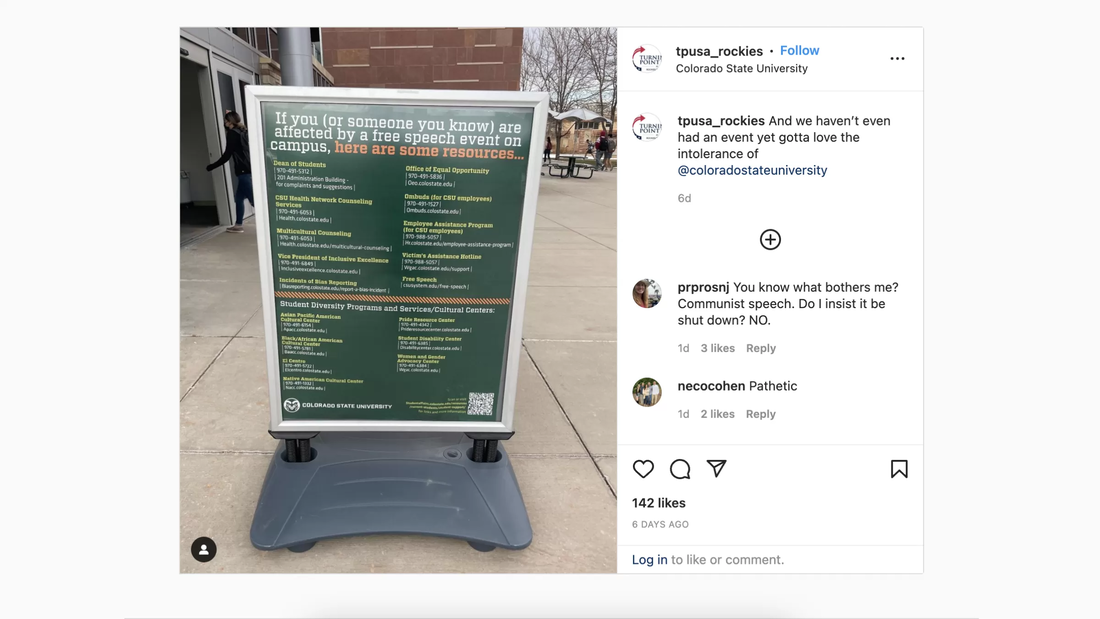|
This image from Colorado State University is making the rounds on social media and in Reason Magazine.
This sign helpfully directs a student to the many offices and resources available to protect her or him from “a free speech event.” Either this sign was created with an astonishing lack of self-awareness, or the authors are fully self-aware of what they are saying and are bent on redefining “free speech” as a roaming threat to students’ well-being. Whichever you choose, it is enough to make George Orwell spit out his nice cup of tea. This image comes on the heels of the story about Georgetown University’s pending defenestration of Ilya Shapiro, the scholar who was today to assume a job as executive director of the Georgetown Center of the Constitution. As reported by journalist Bari Weiss, Shapiro posted a tweet a few days ago that criticized the racial and gender category President Biden set for his Supreme Court nominee. And as is characteristic of so many Twitter compositions, Shapiro blundered with his thumbs. He contrasted a male candidate he considers to be the best possible choice, Judge Sri Srinivasan, with anyone else, including, in his words, “a lesser black woman.” The blowback was immediate, and a mob quickly called for Shapiro’s relationship with Georgetown to be terminated. To be sure, Shapiro’s tweet shows that the authors of the Colorado State University sign are not entirely wrong. Free speech between well-meaning people can sometimes hurt. That’s a risk we run in the fast, free exchange of ideas, especially in casual environments like Twitter. But at Georgetown, one doesn’t have to be particularly well-meaning to be defended by the university, provided the speech comes with the appropriate ideological slant. As Weiss recounts, Georgetown professor Carol Christine Fair had her free speech rights affirmed after she tweeted that U.S. senators who supported Judge Brett Kavanaugh’s nomination to the Supreme Court “deserve miserable deaths” and that “we” should “castrate their corpses and feed them to swine.” In the aftermath of this tweet, Georgetown vigorously supported Fair, noting that it allows ideas that “may be difficult, controversial or objectionable” from faculty members in their private capacity. Shapiro, for his part, quickly deleted his careless tweet and sent an open letter apologizing for his inartful language. But even after Shapiro’s apology, the calls for his termination continued. As Weiss reports, “these days, sincere apologies do not function as expressions of regret but as confessions of guilt.” Shapiro is now on leave while the university investigates his tweets. The ever-alert Foundation for Individual Rights in Education (FIRE) has brought 50 faculty members and higher-education leaders from across the ideological spectrum to Shapiro’s defense. But the overall lesson to be drawn from this story is that if you have views that go against the grain on campus, you had better be exact in every comment. A slip of the tongue or an inartful tweet can end one’s career. On the other hand, if your views are in line with the prevailing ideology, you can call for U.S. senators to suffer miserable deaths and castration. Interestingly, Fair responded to questions about Shapiro by saying: “In general, I believe that the only response to speech one doesn’t like is more speech and I decry cancel culture on any side.” Although intemperate in her own language, Fair is laudable in her defense of the freedom of speech in the Academy. Protect The 1st will follow Shapiro’s case, as well as the free speech rights of others – left, right and center. Comments are closed.
|
Archives
June 2024
Categories
All
|
ABOUT |
ISSUES |
TAKE ACTION |



 RSS Feed
RSS Feed